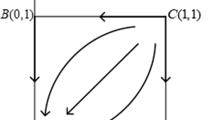Abstract
This paper analyzes the labor–employer relations during conditions that lead to strike using an evolutionary game and catastrophe theory. During a threat to strike, the employers may accept the whole or only a part of the demands of labors and improve the work conditions or decline the demands, and each selected strategies has its respective costs and benefits. The threat to strike action causes the formation of a game between the strikers and employers that in which, as time goes on, different strategies are evaluated by the players and the effective variables of strike faced gradual and continuous changes, which can lead to a sudden jump of the variables and push the system to very different conditions such as dramatic increase or decrease in the probability of selecting strategies. So the alliance between labors could suffer or reinforce. This discrete sudden change is called catastrophe. In this study after finding evolutionary stable strategies for each player, the catastrophe threshold analyzed by nonlinear evolutionary game and the managerial insight is proposed to employers to prevent the parameters from crossing the border of the catastrophe set that leads to a general strike.




Similar content being viewed by others
References
Baumol W (1952) Welfare economics and the theory of the state. Harvard University Press, Cambridge
Clemhout S, Leitman G, Wan JR (1975) Bargaining under strike: a differential game view. J Econ Theory 11:55–67
Dimas ID, Rebelo T, Lourenço PR, Rocha H (2018) A cusp catastrophe model for satisfaction, conflict, and conflict management in teams. In: Gervasi O, et al. (eds) Computational science and its applications—ICCSA 2018. ICCSA 2018. Lecture notes in computer science, vol 10961. Springer, Cham
Hu B, Xia N (2015) Cusp catastrophe model for sudden changes in a person’s behavior. Inf Sci 294:489–512
Ito H, Tanimoto J (2018) Scaling the phase-planes of social dilemma strengths shows game-class changes in the five rules governing the evolution of cooperation. R Soc Open Sci 5(10):181085
Kim H, Cho S (2009) Modeling multi-agent labor market based on co-evolutionary computation and game theory. In: 2009 IEEE congress on evolutionary computation, pp 2143–2148
Lai M (2016) Labor strike and negative-sum game. SSRN: https://ssrn.com/abstract=2881112 or https://dx.doi.org/10.2139/ssrn.2881112
Monkam A (2010) The UK's right to strike and the political impacts of European laws, LL.M Laws. University of East Englia, School of Law
Tanimoto J (2019) Evolutionary games with sociophysics: analysis of traffic flow and epidemics. Springer, Tokyo
Tanimoto J, Sagara H (2007) Relationship between dilemma occurrence and the existence of a weakly dominant strategy in a two-player symmetric game. BioSystems 90(1):105–114
Thom R (1972) Structural stability and morphogenesis an outline of a general theory of models. Addison-Wesley Reading, MA, Boston
Wang Z, Kokubo S, Jusup M, Tanimoto J (2015) Universal scaling for the dilemma strength in evolutionary games. Phys Life Rev 14:1–30
Xu Y, Bin H, Wu J, Zhang J (2014) Nonlinear analysis of the cooperation of strategic alliances through stochastic catastrophe theory. Phys A 400:100–108
Zeeman EC (1976) Catastrophe theory. Sci Am 234(4):65–83
Zhang J, Qiaoyu Li Q, Zhang Ch (2018) Evolutionary dynamics of division of labor games with selfish agents. Europhys Lett 120(3):38002
Author information
Authors and Affiliations
Corresponding author
Additional information
Publisher's Note
Springer Nature remains neutral with regard to jurisdictional claims in published maps and institutional affiliations.
Rights and permissions
About this article
Cite this article
Makui, A., Seyedhosseini, S.M., Sadjadi, S.J. et al. Analysis of labor strike based on evolutionary game and catastrophe theory. EURO J Decis Process 8, 79–88 (2020). https://doi.org/10.1007/s40070-020-00111-y
Received:
Accepted:
Published:
Issue Date:
DOI: https://doi.org/10.1007/s40070-020-00111-y




